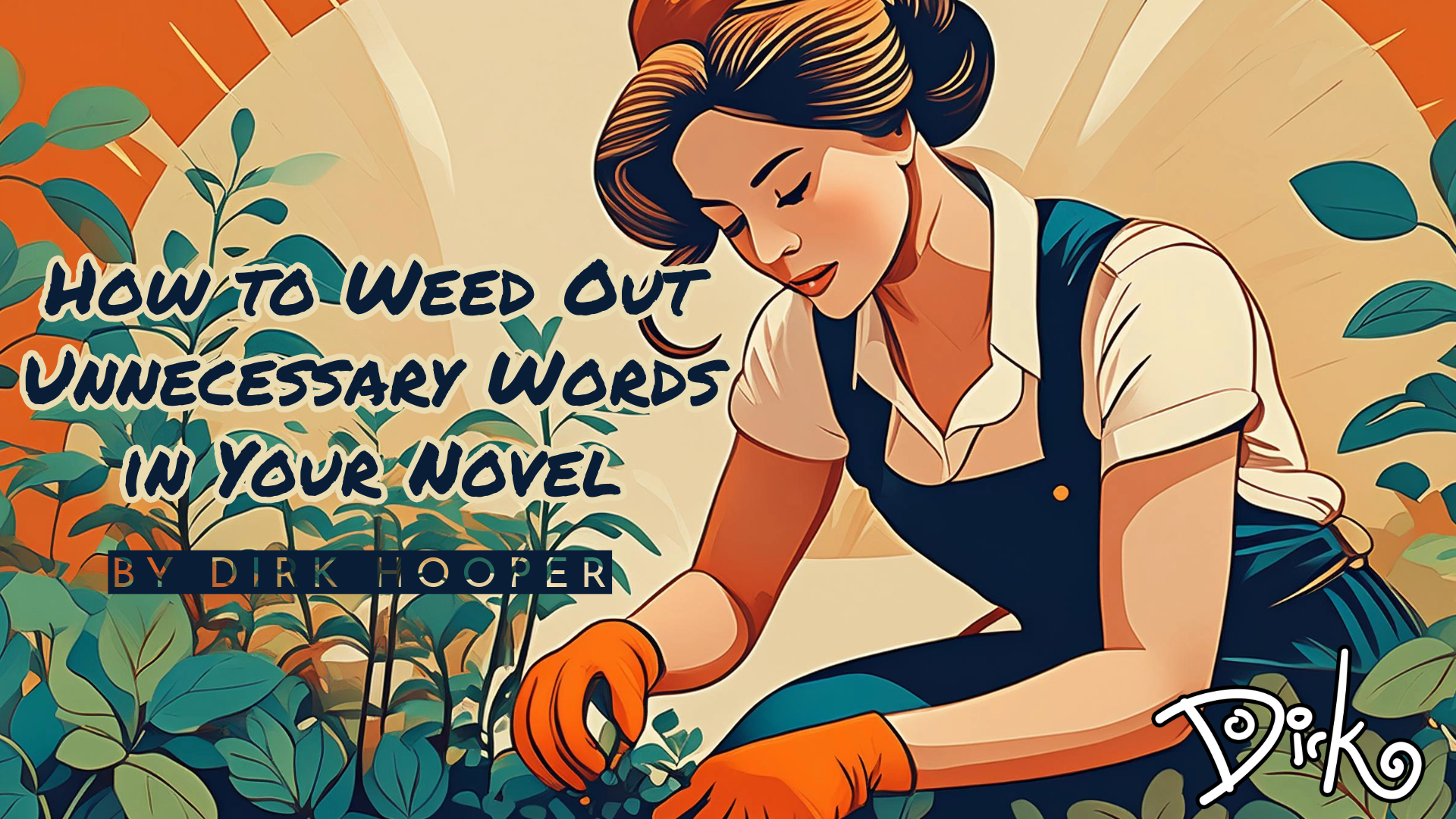
By Dirk Hooper
Editing a novel is a huge process, and it’s hard for someone who wrote the work to evaluate it honestly. That’s why writers and publishers turn to editors to do cleanup.
I just finished writing and editing my second novel, and I chose to do all the editing work myself. That was mostly a decision based on finances, but I’ve been paid to do editing and I’m a grammar wonk, so I’m comfortable doing the job.
What I’m detailing below is a list of resources, and the types of words and phrases to remove. Going through this process will make your work tighter, engaging, and professional.
Resources
This is a recent development, but there are several apps that will hunt down many of the words and phrases that editors suggest you remove. They will also correct punctuation, catch repeated phrases, and a whole host of things that can honestly take you too far down the rabbit hole.
Once I got past the second round of editing, I paid for a month of ProWritingAid and ran a general scan of my book, then focused on some of what I thought were problem areas.
If you’re always editing stuff, the monthly fee for ProWritingAid is around $30 a month. And it’s worth it. But I just paid for one month because I use other apps for daily writing and articles. If $30 a month is in your budget, and you’re editing stuff all the time, then it’s a good investment. They have a substantial monthly discount if you pay yearly.
Grammarly offers a similar professional-level service, but I chose ProWritingAid because it had an emphasis on creative writing. But even Microsoft Word now has a good quality grammar check. It’s not as in-depth as Grammarly or ProWritingAid, but it’s good.
You can spend the rest of your life editing one novel, so my advice is to use the apps to point out potential problem areas but remember that you’re the writer and you get to make the final decisions on this.
I dismiss what apps suggest all the time. Sometimes their suggestions are wrong, and sometimes, they are wrong for YOU. Don’t let a computer (or an editor, or anyone else) determine what your unique writing voice should be. Only you can make the final call. Don’t abdicate your own responsibility for guarding your voice.
Before I move on, there are other apps that help with grammar, and they may be fantastic, but I mentioned the ones I’ve used successfully.
Types of Words or Phrases to Remove
One last time I want to point out that you must use your own judgement on which words and phrases to remove. These are just suggestions of where the biggest problems are. The last thing you want to do is edit your manuscript into oblivion.
Also, unless you have a character that always speaks with correct grammar, keep in mind that dialog will frequently defy the rules. I don’t have to tell you that most people don’t speak with perfect grammar. And that’s okay. Always lean toward being accurate to the character’s speech rather than be crazy about dialog being grammatically correct.
Adverbs
In Stephen King’s book “On Writing” he made a strong case for removing adverbs. His rules on adverbs have become a rallying cry for edits in the writing community. I’ve heard many authors and editors echo his directive.
Adverbs are modifiers for verbs, adjectives, or sentences. Adverbs, particularly the ones that end in “-ly” typically represent poor verb choices.
Example:
- Weak: He breathed loudly.
- Strong: He snorted.
But be careful with this rule. If you read Stephen King’s novels, you’ll notice that (gasp!) he uses adverbs all the time. Yes, you can remove them all but you’re holding yourself to a standard that no one else does. And sometimes using adverbs is stronger or works with your writing style. Always use your best judgment.
Repeated Phrases
You may not even be aware of how often you use certain words or phrases. When I ran the check on ProWritingAid I discovered that I used “feel” or “feeling” dozens of times throughout my manuscript. There’s nothing wrong with those words, but it’s a problem when you go to the same word too often.
What I ended up doing was cutting down about two thirds of the instances of those words, replacing them with something that was more descriptive for the moment.
It will be hard for you to even catch that unless you’re using an app that seeks them out. I promise that you’ll be surprised with the words and phrases you repeat the most. I found that there were about ten words and phrases that were repeated enough that I needed to weed them out.
I know when I read other author’s work I catch those phrases as well. Unless you’re using those phrases consciously to indicate something, it’s better to get rid of them, especially if they are unusual and unintentional.
Weasel Words
These are words that are fillers or make your prose ambiguous or misleading. We all use weasel words unconsciously. They are infused in our daily speech. But when you’re writing, weasel words gum up the works. Once you identify weasel words and start hunting for them, you’ll notice them everywhere. You’ll also see how removing them makes your writing stronger.
Here’s an insanely long, but still incomplete, list of weasel words:
some, many, most, few, much, often, frequently, generally, typically, kind of, sort of, maybe, possibly, probably, usually, apparently, it seems, it appears, in some cases, to some extent, in a way, a lot, numerous, several, various, significant, considerable, substantial, relatively, nearly, almost, virtually, essentially, largely, somewhat, somehow, perhaps, arguably, could, might, would, should, likely, generally speaking, according to some, people say, experts say, research shows, studies indicate, it is believed, it is thought, it is said, it is known, there is evidence that, it is often reported, apparently, allegedly, presumably, supposedly, reportedly, it could be argued, it has been suggested, arguably, seemingly, conceivably, undoubtedly, undeniably, clearly, evidently, obviously, simply, naturally, certainly, surely, for the most part, in most cases, in general, in some respects, more or less, broadly speaking
That
Yes, “that.” When you start digging through your manuscript, go for “that” with extreme prejudice. If you’re like me, you’ll find that removing “that” from your sentence makes it tighter and doesn’t change the meaning at all. (You can see how by removing “that” from the previous sentence.)
Examples:
- Original: She said that she would come to the party.
Without “that”: She said she would come to the party. - Original: He knew that the test was going to be difficult.
Without “that”: He knew the test was going to be difficult.
Cliché Phrases
I try to catch these while I’m writing, but even the best of us misses this. Cliché phrases lack the punch that fresh takes would deliver. It’s shorthand for writing that could and should be described in a new way. It’s so much more fun to reach for your own unique phrases. It’s even more fun when people pick up your phrases and turn them into clichés.
Examples:
- Cliché: “As quiet as a mouse.”
Improved: “Her footsteps were whispers on the hardwood floor.” - Cliché: “Fit as a fiddle.”
Improved: “He moved with the grace and strength of a well-tuned athlete.”
Passive Voice
Passive voice is where the object of an action becomes the subject in a sentence. If you use Grammarly or ProWritingAid, they will savagely attack all your passive voice sentences. The reason they suggest cutting down on passive voice is to make your writing clear, impactful, direct, and exciting.
Here are some examples of passive voice and how active voice can improve the sentence.
- Passive: The report was written. (Who wrote the report?)
Active: The analyst wrote the report. - Passive: The ball was thrown by John. (Weak)
Active: John threw the ball. - Passive: The cake was eaten by the children. (Wordy)
Active: The children ate the cake.
Filter Words
Earlier, I mentioned that I used the word “feel” too much in my novel. “Feel” is a filter word that filters the action through the character’s perception, making the writing distant, less impactful, and wordier.
Common Filter Words
- Feel
- Hear
- Think
- Believe
- Notice
- Realize
- Wonder
- Sound
- Look
- Seem
Examples
- With Filter Words: I think we should go left.
Without Filter Words: We should go left. - With Filter Words: She noticed that the room was unusually quiet.
Without Filter Words: The room was unusually quiet. - With Filter Words: He realized he had left his keys on the table.
Without Filter Words: His keys were on the table.
I’ll add one last thing before wrapping this up. I used the suggestions that Word offers on this article, but I’m still not totally confident my grammar is right on this article. The fear is elevated because this is an article on grammar! So, my final piece of advice is to read your work out loud, or even better, invite a friend to read it before you call it done.
But also realize that no matter what you do nothing comes out pristine. There are conflicting rules, apps miss stuff, people miss stuff, and some of what you write is meant to be your unique voice.
After five revisions of my new novel I had to call it good. You have to have the courage to let it go at some point.
Don’t be so obsessed with grammar perfection that you never call it done. Eventually, it’s time to share it with the world.
